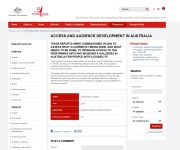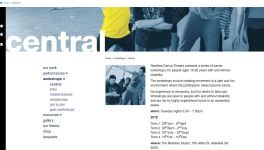Items
Search full-text
“Activism leads to a Disability Royal Commission”
-
 "Australia Council - Access and audience development in Australia" Australia Council - 'Access and audience development in Australia' reports - reads, in part "These reports were commissioned in 2004 to assess what is currently being done, and what needs to be done, to increase access to the performing arts and museums & galleries in Australia for people with a disability."
"Australia Council - Access and audience development in Australia" Australia Council - 'Access and audience development in Australia' reports - reads, in part "These reports were commissioned in 2004 to assess what is currently being done, and what needs to be done, to increase access to the performing arts and museums & galleries in Australia for people with a disability." -
 "Accessible Arts - Creative Initiatives, captured 2022" Accessible Arts - Creative Initiatives - reads, in part "The unique perspectives and experiences of artists with disability – as well as the intersection of cultural identities across all types of disability – present exciting avenues for new artistic possibilities right across the spectrum of visual, performing, literary, screen and digital arts. We’re here to work with arts and cultural organisations, government agencies and other funding partners to deliver creative initiatives focused on providing development and production opportunities for all kinds of artists with disability or who are d/Deaf."
"Accessible Arts - Creative Initiatives, captured 2022" Accessible Arts - Creative Initiatives - reads, in part "The unique perspectives and experiences of artists with disability – as well as the intersection of cultural identities across all types of disability – present exciting avenues for new artistic possibilities right across the spectrum of visual, performing, literary, screen and digital arts. We’re here to work with arts and cultural organisations, government agencies and other funding partners to deliver creative initiatives focused on providing development and production opportunities for all kinds of artists with disability or who are d/Deaf." -
 "Restless Dance - Central Workshop" Restless Dance Theatre website, 'Central Workshop,' captured 2020 – reads, in part, "Restless Dance Theatre presents a series of dance workshops, for people aged 15-26 years with and without disability. The workshops involve creating movement in a safe and fun environment where the participants’ ideas become dance. No experience is necessary, just the desire to take part. Workshops are open to people with and without disability and are led by highly experienced tutors in an accessible space."
"Restless Dance - Central Workshop" Restless Dance Theatre website, 'Central Workshop,' captured 2020 – reads, in part, "Restless Dance Theatre presents a series of dance workshops, for people aged 15-26 years with and without disability. The workshops involve creating movement in a safe and fun environment where the participants’ ideas become dance. No experience is necessary, just the desire to take part. Workshops are open to people with and without disability and are led by highly experienced tutors in an accessible space." -
"Australia Council commissions a research study on people with disabilities' participation in arts activities" Australia Council commissioned a research study on the problems faced by people with disabilities attempting to participate in art activities (Australia Council Annual reports 1979/1980 and 1980/1981).
-
"Making the arts work for everyone: a resource and information kit about arts and disabilities produced in 1995" Arts Access Victoria and Australia Council published 'Making the Arts Work for Everyone: A Resource and Information Kit about Arts and Disabilities' in 1995.
-
"The Australian Elizabethan Theatre Trust begins operations in 1954" The Australian Elizabethan Theatre Trust began operations in 1954. The key role of the trust was to support the arts in Australia leading to the independent companies of: Opera Australia, The Australian Ballet Foundation, National Institute of Dramatic Art (NIDA), and Bell Shakespeare Company. At this time there was little involvement of people with disabilities in the arts.
-
"The Australian Council for the Arts established in 1968" The Australian Council for the Arts was established in 1968. This came after a push during the late 1960s for better support of the arts in Australia. The Council replaced the Elizabethan Trust as Australia’s main arts body, although the Trust continued to receive funding from State governments. The Council was later given statutory authority in 1975 and called Australia Council. Prime Minister Gough Whitlam is recognised as a key political supporter of the arts. The election of Whitlam (serving from December 1972 to November 1975) gave unprecedented and considerable attention and funding to an arts policy which would establish an Australian cultural identity raising international awareness. The Australian Council for the Arts received an unprecedented $14 million in funding in the 1973/74 budget. This was “more than double the allocation the bodies out of which it evolved had received the year before. The Council’s allocation was increased by a further 50 per cent in the 1974/75 Budget."
-
“Assistance to Composers Advisory Board created by the Commonwealth government.” In 1967, the Commonwealth government created the Assistance to Composers Advisory Board with an aim to advise on funding needs for music composition and promotion of Australian composers. The Board was to judge work based on “musical distinction or excellence of its kind, and on the promotion of Australian composers both in Australia and abroad”. The Board’s functions were later absorbed by the Australia Council.
-
"The Australia Council establishes the Community Arts Committee in 1973 and the Community Arts Board in 1978" The Australia Council established the Community Arts Committee in 1973 and the Community Arts Board in 1978. The purpose of the latter was to encourage wider participation in the arts, especially for groups with little social capital. The Board was “the first funding body to identify the community arts phenomenon and respond with definition and policy." This occurred under the directorship of Rosalie Bower, the first director of the Community Arts Board, who wrote in a paper entitled 'The Case for a Community Arts Centre': “The activities within a centre should be accessible to children, aged people, the physically handicapped, ethnic groups and those whose time is severely restricted by work and family ties. The activities supplied by the centre should be conducted free from competitive elements which otherwise might discourage people from participation, and they must be inexpensive and accessible at almost any time. They must not pre-suppose education or income levels which would cut them off from any section of the community.'" (Australia Council 1979/1980 Annual Report, page 32)
-
“The Australian Theatre of the Deaf established” In 1973, the Australian Theatre of the Deaf (ATOD) began as an amateur drama group. ATOD became a professional group in 1979 and staged many works during the decades to follow. Leading ATOD actors were interviewed in the 1990s for SBS about their work; snippets of a rehearsal were captured on film.
-
“The Deaf Film Society creates the documentary ‘Our World’.” In 1970, the Deaf Film Society created a documentary called ‘Our World’ on the lived experience of people who were d/Deaf. The Adult Deaf Society assisted with the project.
-
“New South Wales Theatre of the Deaf produces its first performance in 1973” The New South Wales Theatre of the Deaf (NSW TOD) produced its first performance on 17 November 1973. The company performed Variations on Peer Gynt (after Henrik Ibsen) at the Newington College Theatrette. “An amateur theatre company, NSW TOD, also known as Deaf Drama Club, was established via arts funding becoming available through the newly established Australia Council.” (Racheal Missingham. 2021. “Australia’s Deaf Theatre: past, present and future.” Thesis. page 23)
-
“Australia Council praises NSW Theatre of the Deaf and provides some funding to the Deaf theatres throughout the 1970s” The 1976/77 Australia Council annual report stated: "The NSW Theatre of the Deaf is a significant achievement. The only funded organisation in Australia working in nonverbal theatre, its production of King Lear received widespread praise. This company is now accepted as operating in a legitimate area of theatre rather than performing mime works for the deaf. This offers wide scope for innovation." The Council’s 1977/78 annual report recorded that it granted funding to the NSW Theatre of the Deaf “towards salaries of artistic director, deaf director, and tutors’ fees in 1978” for $25,000; the “presentation of theatre pieces (mime, clowning, puppetry) in public performance” for $2,500, and “towards costs of a production in 1978” for $4,000. It also awarded $1,980 to Queensland Theatre of the Deaf “towards the cost of transporting company to Sydney for seminar with NSW Theatre of the Deaf”. Drama Resource Centre (Victoria) received $2,840 “to develop student theatre at Victoria School for Deaf Children” and $630 went to Children’s Activities Time Society (Western Australia) for the “cost of deaf mime artist, Rae Gibson, to undertake four week visit to Melbourne and Sydney to work with deaf artists”. The following annual report for 1978/79 recorded that the Council granted $25,000 to the NSW Theatre of the Deaf “towards salaries of artistic director, administrator and tutors” in 1979. The Council also awarded $1,800 to the Queensland Theatre of the Deaf towards a salary for Geoffrey Rush to work with the company in 1979. The 1979/1980 Australia Council annual report mentions funding “provided for a playwright-in-residence at the NSW Theatre of the Deaf.”
-
“Disabled actors perform at Melbourne Concert Hall” In 1982, 50 “handicapped” actors (though none were named in the media) were involved in Access Arts’ ‘Theorem’ at the Melbourne Concert Hall, an example of inclusive arts practice. The performance received broad public attention.
-
“Documentary ‘Stepping Out’ follows first group of intellectually disabled people to perform at the Sydney Opera House” In preparation for the International Year of Disabled Persons, a documentary was made called ‘Stepping Out’ directed by Chris Noonan and narrated by Romayne Grace, a resident at the Lorna Hodgkinson Sunshine Home. The documentary follows a group of residents as they prepare for their big debut at the Sydney Opera House. The movie was shown during the International Year of the Disabled's UN closing ceremony. The 1979/1980 Australia Council report had the following statement "A production staged at the Sydney Opera House by residents of the Lorna Hodgkinson Sunshine Home for the intellectually handicapped impressed the Theatre Board as both innovative arts-based therapy and worthwhile theatre in its own right." The 1980/81 report further stated "It was the first time anywhere in the world that a group of mentally handicapped people had performed publicly in the cultural centre of their city."
-
“Tutti Arts is founded in Adelaide by Pat Rix in 1997” Tutti Arts was founded in Adelaide by Pat Rix in 1997. Initially a choir of people with and without disabilities, it quickly added a focus on visual arts. Tutti has since expanded to offer programs in dance, screen, music, acting, and visual arts, and its choir continues. Programs are on offer in Brighton, Port Adelaide, and in the Barossa Valley, for adults as well as kids and youth. Tutti has performed both nationally and internationally, and has taken part in significant co-productions. Tutti Arts and KickstARt 2 Choir presented Up and Away for the KickstART Festival in Vancouver, Canada in 2004. Tutti’s international performance of 'Between the Worlds' in Minneapolis, Minnesota (2007) was remounted as a coproduction with Interact Center for the Performing and Visual Arts. Tutti returned to Minneapolis in 2009 to perform ‘Northern Lights, Southern Cross,’ which they first performed in 2007 for Adelaide Fringe. It was a collaboration with Interact, which brought together Aboriginal, Native American and Disabled Artists from the Northern and Southern hemispheres “to explore personal, racial and environmental trauma.” In 2009, Tutti Ensemble performed with the State Opera of South Australia to present ‘The Shouting Fence’.
-
“Access Arts commissions a multi-arts project, Peter Vance performs the song ‘Welcome to My Day’ at the 1999 Wataboshi Festival in Japan” Peter Vance was asked by Access Arts to team up with Ant McKenna to compose a song. He then performed ‘Welcome to My Day’ at the 5th Asia Pacific Wataboshi Music Festival in Japan in 1999. Access Arts sent disposable cameras out to members across Queensland; each story became a collage in the State Library foyer as a day-in-the-life of each artist.
-
“Fusion Theatre established in 1997” Fusion Theatre (Victoria) was established in 1997. "Since its beginnings as a drama group, Fusion has expanded into two main performance ensembles that make up the company. The ensemble members collaborate with professional theatre makers, guest performing artists and designers, to devise theatre performances based on the stories, imagination and ideas of all participants." Fusion Theatre’s ongoing association with Deakin University's Faculty of Arts and Education means that each year, Deakin’s theatre and drama students work with Fusion as artists, performers, assistants, and theatre technicians. Some alumni continue to be involved with the company.
-
“Melbourne venue guides published in the 1990s” Arts Access Victoria published the ‘Melbourne Venue Guide: A Description of Access for People with Disabilities to Some of Melbourne's Major Entertainment Venues’ in 1992. They published an updated guide in 1998: ‘The Vic Venue Guide: A Guide to Access and Facilities at Over 75 Victorian Entertainment, Sporting and Cultural Venues’. This updated guide was produced in conjunction with VicHealth and supported by Arts Victoria. The guide provided information about where to make bookings, parking and public transport, facilities and access for disabled patrons, and seating.
-
“The national tour of the exhibition BodySuits results in commissions and new opportunities for artists” A visual arts exhibition, BodySuits, toured nationally between 1997 and 1999. It was curated by Jane Trengove. This resulted in commissions and new opportunities for artists. Arts Access Victoria published a catalogue for the exhibition in 1997; the exhibition showed in Melbourne from 5 July - 2 August 1997 at 200 Gertrude Street, Fitzroy (a location now known as Gertrude Contemporary).
-
“Salubrious Productions (QLD) established in 1999” Salubrious Productions (Queensland) was established in 1999. Salubrious is an agency for disabled artists, representing musicians, writers and composers, theatre performers and actors, visual artists, and technicians in the creative industries. The agency continues operation today. Their website describes them as follows: “Salubrious Productions is a Brisbane-based entertainment and production agency. We represent a core of more than 200 diverse acts and artists and draw further from a large network of professional artists throughout Queensland and Australia.”
-
“The Australian Government’s Creative Nation policy released in 1994” ‘Creative Nation’ was released in 1994. This was the first ever cultural policy formally developed by an Australian Government. Alongside a number of art forms, the policy included establishments like libraries in its definition of culture and pledged $250 million in funding to cultural organisations.
-
“Deaf Arts Network (DAN) established in 2000” The Deaf Arts Network (DAN) was established with the aid of Arts Access Victoria in Melbourne in 2000. DAN “is dedicated to increasing the participation of deaf and hard of hearing people in the arts as artists, arts workers and audiences. […] DAN provides an authentic and unique cultural voice for the deaf community, a community historically marginalised from participation in the arts.”
-
“The paralympic arts festival, Invincible Summer, is held in conjunction with the 2000 Paralympic games” In 2000, Sydney held the Paralympic games. The paralympic arts festival, Invincible Summer, featured comedy, dance, film, art, music, theatre, and street performance, featuring collaborations between artists with and without disabilities.
-
“Flow Festival, Australia’s Deaf Arts festival, is founded” Flow Festival, Australia’s Deaf Arts festival, was founded in 2018 by Ramas McRae, Irene Holub, and Medina Sumovic. The Deaf-led biennial festival provides a groundbreaking and dedicated platform for established and emerging Deaf/Hard of Hearing artists. Flow is held in Victoria but is described as “Australia’s national celebration of Deaf arts and culture”.
